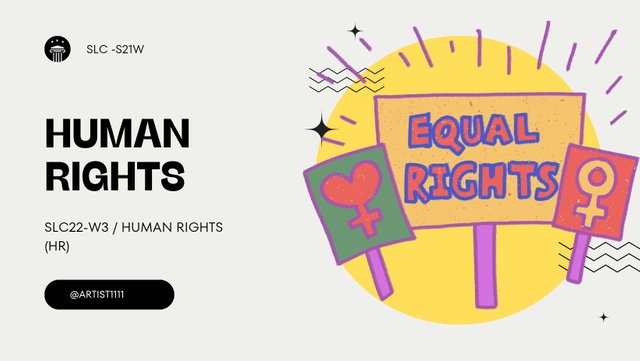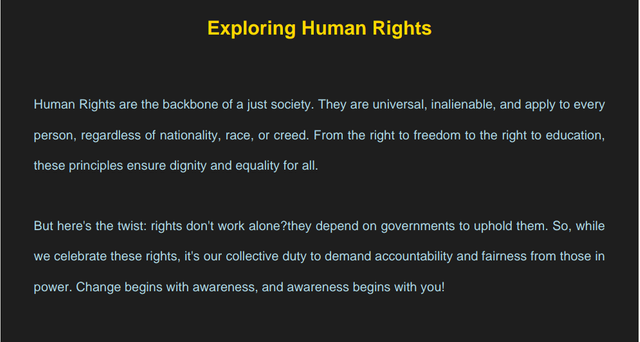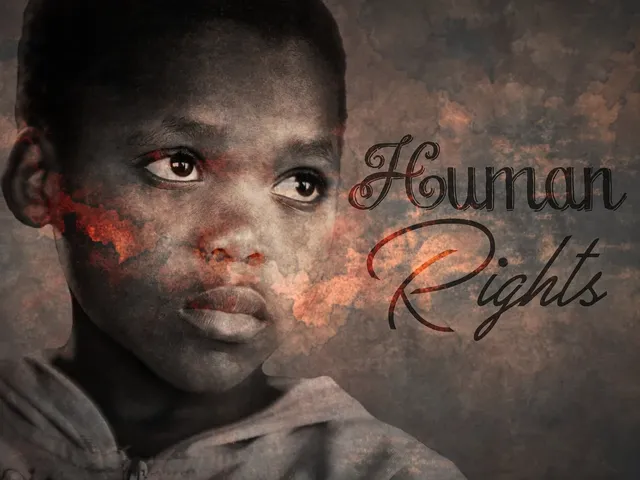SLC22-W3 / Human Rights (HR)

Canvas source Part 1
Based on what was explained in class, state in your own words and with explanations whether you consider that human rights are respected or violated in your country.
Based on what was explained in class, I’d say the situation of human rights in my country is... complicated! Some rights are respected—like the right to a decent cup of chai (just kidding!)—but others, not so much. While we may enjoy freedom of expression on paper, sometimes it feels like expressing the wrong opinion could turn you into the villain of the week.
The right to a fair trial is another story. It exists in theory, but in practice? Let’s just say it’s a slow-moving snail. Meanwhile, rights like equal opportunities can feel more like dreams than realities, especially if you’re from a marginalized community. The system has its favorites, and that’s no secret.
When it comes to economic rights, things get even trickier. Access to healthcare and education often depends on how thick your wallet is—making you wonder if these rights come with hidden price tags. Not exactly "universal," right?
Overall, I’d say human rights here are treated like New Year’s resolutions: we talk about them a lot, but the follow-through is hit or miss. Sure, progress is being made, but we still have miles to go!
Please state, according to the laws of your country, whether Human Rights have the same value as the Constitution of your country, whether they are supra-constitutional, or whether the Constitution prevails over international treaties on Human Rights.
In Pakistan, the constitution is declared as the supreme law of the country, meaning that it is at the apex of the law hierarchy. The international human rights treaties which Pakistan ratified have a huge impact and play a significant role but are not directly incorporated into domestic law. Such treaties could be incorporated only by specific legislation to be enforced by Pakistan into its national legal order.
This means, while Pakistan is committed to international human rights standards, domestic law prevails over international treaties in conflict. Hence, international human rights treaties cannot be classified as supra-constitutional; the Constitution remains the highest authority of law.
Practically, this entails the government having to make an intentional effort of harmonizing domestic laws with its international human rights obligations so that the national legal framework is one that reflects commitment at the international level. Legislative action is also crucial in enforcing human rights safeguards in Pakistan properly.
For further details on Pakistan's domestic implementation of its international human rights obligations, Here

Part 2
I mentioned any organisation in your region that has jurisdiction over human rights. In your opinion, how useful it has been and how its operation has influenced respect for human rights in your country.
There is a prominent organization that has jurisdiction over human rights in my region, called the National Human Rights Commission (NHRC). This body monitors the protection of human rights and also acts as a watchdog against any violation by governmental or individual forces.
In my opinion, the NHRC has been somewhat useful but has mixed effects. While providing an avenue to voice complaints has empowered people to take action and to raise consciousness of violations of human rights, in contrast, it appears that this impact is too often superficial: it cannot actually command the government's compliance in fulfilling the NHRC's suggestions. Sometimes it even looks as if it's just mere shouting by the NHRC without authority.
The operation of the NHRC has, of course, highlighted human rights issues, but true progress usually relies on the will of the government and the institutions to take action. Therefore, while it has contributed to some improvements, much more needs to be done to achieve full human rights protection.
Have you or someone close to you been a victim of human rights violations? If so, what was the situation and were you able to assert your rights?
Yes, one of my relatives was a victim of human rights violations. She was discriminated against at work, where the right to equal opportunity was not respected. Though she was the most qualified employee, she was denied a promotion in favor of a less-experienced employee only because of her background. That made her feel disrespected and excluded; it was, without a doubt, a violation of her right to fair treatment.
Unfortunately, they failed to assert their rights as effectively as they should have. The system in the workplace was one of ignoring complaints, and though they voiced the issue, nothing was done. The inefficiency of support from the system would not allow the people to pinpoint who was to be held responsible.
In the end, they decided to leave the job, but the experience was a harsh reminder of how important it is to stand up for human rights and how vital it is to have systems in place that support individuals when their rights are violated.

Part 3
Case study 1.
A woman loses her son when he dies at the hands of assailants who kill him to steal his car. The assailants are later arrested and prosecuted for the murder. He is serving the sentence provided for by law. However, the woman believes that her right to life has been violated and decides to file a complaint with the Inter-American Commission on Human Rights.
Please state whether you believe that the human rights of the victim in this case were indeed violated and whether the complaint to the aforementioned body should be admitted or not. Explain your answers.
In this case, in no way were the human rights of the victim, in this case, the mother of the boy who was lost, violated. Though her bereavement and loss are tragic, the violation of her right to life would always refer to the deceased in that case, not the mother. This right to life would have been violated if the son had been lawfully killed or if his life was not protected by the state. In this case, however, the murder is at the hands of private persons, assailants, and it is just the course of the law in taking the same for prosecution and appropriate sentencing.
On the complaint filed before the Inter-American Commission on Human Rights, there is a possibility of non-admission. The Inter-American Commission deals with cases where a state has violated human rights, either by action or by omission. In this case, the state's legal system has already acted by prosecuting the perpetrators of the crime. Therefore, though the mother's suffering is deeply tragic, the violation of her human rights, particularly the right to life, is not supported by the facts of the case.
That aside, if the mother felt that a legal process run by the state or that its failure to satisfy crime would infringe on her right to justice or fair treatment, she could potentially draw a remedy for other human rights violations, including denial of justice or psychological harm, although only through a different argument than one that could directly invoke a violation of the right to life.
Case study 2.
A person is arrested in the middle of an anti-government protest. He is beaten by police officers, resulting in his death. The prosecutor assigned to the case begins the investigation without being able to precisely identify the perpetrators of this murder. Several years go by and the victim's relatives turn to the prosecutor's office for an answer, and are told that the case has been closed because several years have passed without being able to identify the officers who caused the death.
Please state whether you believe that the human rights of both the victim and his/her family are being violated. Explain your answers.
Yes, I think that both the victim and his or her family are being violated of their human rights in this case.
First, there is a violation of the right to life of the victim because he was subjected to excessive force and then killed by the police officers. This is an extreme violation of his right to life, which is safeguarded under both international human rights law and most national constitutions.
In addition, the right to justice and an effective remedy are also infringed. An essential component of the right to justice is the right to an investigation of human rights violations. Here, the prosecutor's office did not properly identify the perpetrators of the crime. The case is being closed without accountability. The authorities are denying the family their right to seek redress and know the truth about what happened to their loved one. The right to remedy ensures that when human rights are violated, victims and their families should have the opportunity to hold those responsible accountable, which has not occurred here.
Overall, there has been total neglect of victim's right to life and the family's right to justice in this particular case, clearly violating their human rights.
kind Regards
@artist1111

Adieu, folks!
May the winds of fortune
carry you to greatness!
May the winds of fortune
carry you to greatness!
It’s incredible to see your commitment to justice. Keep spreading awareness and making a difference.